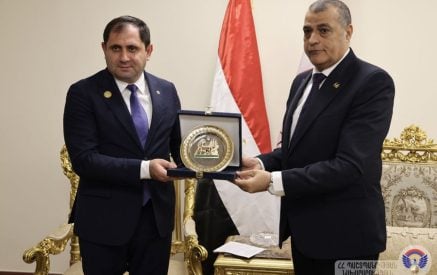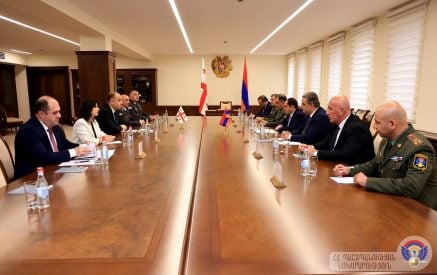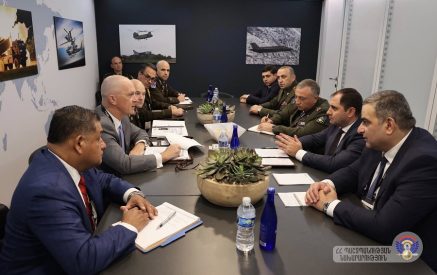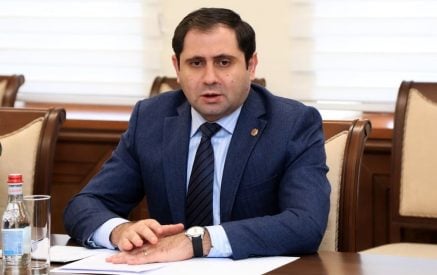Military action initiated by Azerbaijan on the border of Nagorno-Karabakh, which started on April 2, 2016 and continued for four days, was a flagrant violation of the cease-fire agreement signed on May 12, 1994. Subversive operations, provocations and the sniper war over the line of contact were taking place during previous years, and dramatically intensified since August, 2014. However, very recent events left no doubt that official Baku deliberately neglects efforts of the international community towards peaceful resolution of the NK conflict. Recent military actions resulted in numerous human losses among military and civilians from both sides, destructions and dramatic growth of hostilities. The events also posed new challenges for security and stability in the South Caucasus region as a whole. Meanwhile, out of the sides of the conflict only Azerbaijan rejects OSCE Minsk Group recommendation to withdraw snipers from the line of contact.
Azerbaijani statements, insisting that their actions were provoked by and became a response to Armenian aggression, are not more than another act of demagoguery, which can be refuted with several counterarguments. Particularly, for years along the world witnessed the intensifying bellicose rhetoric of Baku aimed at blackmailing the international mediators with the threat of resolving the conflict with the use of force in case if the offered solution will not be preferable for Azerbaijani side only.
It was Azerbaijan that rejected all proposals of Armenia and the OSCE Minsk Group to carry out a border monitoring mission and identify the perpetrators. The proposal to investigate the events of April 2-5, 2016 was also declined by Azerbaijan. The vast majority of international independent experts unequivocally define Azerbaijan as an initiator of recent military clashes. And finally, the statement articulated by Ambassador of Azerbaijani Republic to Russia Mr. Polad Byul-Byul Ogly is a direct confirmation of Azerbaijani aggression[1]. It is worth mentioning, that Azerbaijani aggression, actually, was a result of change in military balance in the region, highly provoked by Russia through its continuous supply of modern armament to Azerbaijan in massive scale.
Battles on the frontline were accompanied by serious war crimes committed by the Azerbaijani military. Those crimes are gross violations of the Genève Convention of 1949 and the Hague Convention of 1954.
For instance, on April 2nd, 2016 a 12-year-old child was killed and two others wounded as a result of MM-21 (Grad) missile systems firing at the local school in Martuni city. On the same day, after temporary capturing of Talish village, Azerbaijani military have brutally killed senior citizens Valera and Razmella Khalapyans, and cut off their ears. They have also killed Marusya Khalapyan, the 92-year-old mother of Valera Khalapyan. Moreover, Azerbaijani military beheaded three soldiers of the NK Defense Army. Both Azerbaijani military and civilians were mocking the head of the killed soldier, ethnically Yezidi Kyaram Sloyan. They were taking pictures with it and sharing photos in the social media. The head of Kyaram Sloyan was taken from village to village and presented as a war trophy. Such manifestations of inhumane atrocities are identical to the barbaric actions taken by ISIL terrorists against Yezidi population. A bus carrying civilians was destroyed by Unmanned Arial Vehicle (UAV) aka drone, and left seven dead and a dozen wounded. On April 10, 2016 through the mediation of the International Committee of the Red Cross (ICRC) and the Office of the Personal Representative of the OSCE Chairman in Office, exchange of bodies of the deceased was carried out between the Nagorno-Karabakh and Azerbaijan near the Bash Karvend settlement. The bodies of 18 servicemen of the NK Defense Army, fallen as a result of the large scale military aggression unleashed by Azerbaijan in April 2-5, were transferred to the NK side during the exchange. At the presence of the representatives of the International Committee of the Red Cross, the NK State Commission on Prisoners of War, Hostages and Missing Persons registered that all bodies of the deceased transferred by the Azerbaijani side had signs of torture and mutilation.
These unconcealed manifestations of hatred and cruelty should leave no doubt that in case of Nagorno-Karabakh appearing under Azerbaijani control, the most inhumane ethnic cleansing of Armenian population will be unavoidable. Thus, it became once again evident that self-determination of the Armenians in Nagorno-Karabakh has no alternative.
Unfortunately, Azerbaijan’s bellicosity and deliberate hindering of the peaceful resolution of the NK conflict does not get an adequate response, on the contrary it is triggered by some countries, including few members of the OSCE Minsk Group. Hence, Turkish leaders expressed their full solidarity and readiness to offer military support in response to the aggressive actions by Azerbaijan. Russian Deputy Prime Minister Dmitri Rogozin during his visit to Baku just after ‘four-day war’ added fuel to the fire by stating that Russia will continue contract-based arms supplies to Azerbaijan[2]. Such attitude expressed by the countries of huge influence in the South Caucasus region leave no choice for Armenia and Nagorno-Karabakh other than exercising all possible and available means in the areas of defense and foreign policy aimed at finding out ways of resilience to the threats which hinder mere existence of Armenia and NK.
The refusal of the Eurasian Union partner countries (which are also members of the Collective Security Treaty Organization together with Armenia) to visit Yerevan on April 7th, 2016 in order to participate in pre-planned session of the EaEU Intergovernmental Council as well as their hypocritical reasoning that it could be perceived as a support to the Armenian side in the conflict with Azerbaijan, puts high in the agenda the expediency of participation of our country in such integration processes which do not correspond to Armenia’s vital interests. The recent events do indicate that this becomes a matter of national security.
Taking into consideration points articulated above we call on the international community
- To compliment the Agreement on Enhancement of Ceasefire Regime, signed by defense ministers of Azerbaijan, Armenia and Nagorno-Karabakh and entered into force in February, 1995 with additional legally binding provisions addressing changed realities. To guarantee their practical application and foresee responsibility for the party that violates the principle of non-use of force.
- To grant a mandate to OSCE respective structures to investigate into incidents taking place in the zone of NK conflict and on the border of Armenia and Azerbaijan, regardless of the consent of the sides. To start that mission with meticulous investigation of circumstances of the large scale military actions that took place on April 2-5 2016. Identify, on official level, those responsible for instigating the war and committing war crimes. The refusal of any of the parties to cooperate with the investigation should be considered as intent of aggression threatening the regional security. This should be reflected in the documents of respective international organizations.
- To return the status of the negotiating party to Nagorno-Karabakh.
- To ensure that the governments of the conflicting parties do restore the necessary conditions for the cooperation of the civil society and media in order to overcome the mutual distrust, xenophobia and propaganda of hostility. To encourage the initiatives promoting the informal direct dialogue.
We demand from the Armenian authorities.
- To initiate a broad debate- which will stipulate political and legal implications- weather Armenia’s membership in EaEU, participation in other formats of international cooperation do correspond to the goal of country’s security and development.
- To take practical measures for the efficient use of national potential for strengthening of the defense capabilities of the country. To consider corruption, vicious methods of governance, monopolization and protectionism in the economy, factitious obstacles for investment and development of small and medium-sized enterprises, restraining civic activism and inertia in diplomacy as imminent threats to country’s security.
We state our readiness
- To investigate all cases of human rights violations in the context of the Nagorno-Karabakh conflict in unbiased and responsible way, regardless of the parties that committed them.
- To contribute to the efforts to hold responsible individuals who violated the universal norms of humanitarian law.
- To cooperate with representatives of all parties to the conflict and relevant international organizations in all above mentioned directions.
We express our full support to the Joint Appeal of the Nagorno-Karabakh and Armenian Non-Governmental organizations, Mass-Media and National Minorities Representatives to the European Parliament signed by more than 500 organizations[3].
[1] In Russian: https://russian.rt.com/article/156824; In English https://en.168.am/2016/04/03/5004.html
[2] https://tass.ru/en/defense/868312
[3] https://www.dropbox.com/s/ey2q0y46nltz4zt/Appeal%20to%20the%20European%20Parliament_11.04.2016_All%20signatures.pdf?oref=e


























































